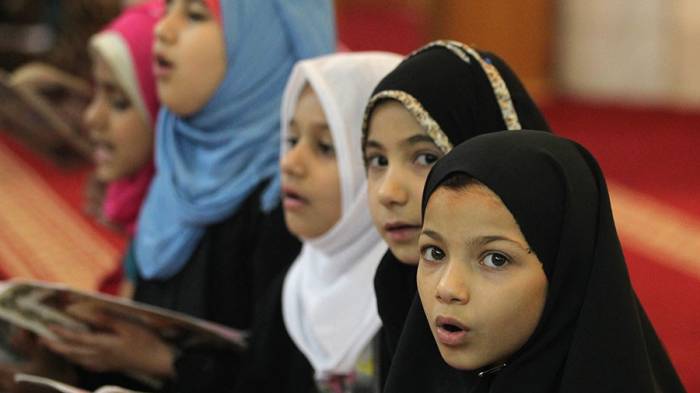Austrian Chancellor Sebastian Kurz’s rapid rise to power has always been centred on his promise to curb immigration and uphold Austria’s identity as a Christian nation. Since taking office in December, 2017, Kurz has sought to make good on this pledge by taking a hard-line stance on immigration. Now, Kurz is closing in on another topic – the presence of hijabs in schools.
A measure against ‘discrimination’
Already during his campaign for the Chancellery Kurz had called for banning the hijab from Austria’s schools (while keeping the Crucifix on display in every classroom). He had also asserted that Muslim women were ‘paid’ to wear the hijab – an assertion recently taken up by controversial German activist Seyran Ateş.1
On April 4, Kurz announced that his government would introduce a new law banning Muslim girls from wearing the hijab while they were students in Austria’s kindergartens and primary schools. “The veiling of infants is nothing that should have a place in our country”, Kurz asserted.
According to Kurz, the intention is to “avoid discrimination” of young children and to provide equal opportunities to boys and girls alike. Hence, the law banning the hijab is to be called ‘Children Protection Act’ (Kinderschutzgesetz).2
Austria’s de facto ban on burqa and niqab
It is not the first legal measure in Austria targeting Muslim women’s clothing. Since October 1, 2017, the Vermummungsgesetz prohibits any clothing covering the face between chin and forehead to be worn in public spaces. Phrased in ostentatiously neutral terms, the law’s real targets were niqab and burqa.
While supported almost unanimously across the Austrian political spectrum, the law’s implementation has turned out to be somewhat farcical. Among the first cases pf unlawful face coverings that led the police to intervene were a psychologist wearing a woollen scarf to protect herself from the wind while cycling home, as well as a man posing in a full-body ninja costume in front of a Lego store in order to advertise the store’s new toy collection.3
In order to allow its inhabitants to cover their faces during a period of severe cold, the city of Vienna ended up ‘de facto suspending’ the prohibition during parts of the winter.4 A quasi-satirical website www.schal-legal.at also popped up, providing up-to-date information on where it was legal (or warm enough) to pull up one’s scarf to cover parts of one’s face.5
‘A symbolic move’
So far, the Vermummungsgesetz has led to 50 complaints being filed. (It is unclear how many of these were actually directed against Muslim women wearing a burqa or a niqab.) As such, its impact has been mostly symbolic.
The proposed new hijab ban in kindergartens and primary schools are also seen – even by some of its defenders – as “a symbolic move”, rather than a measure solving an actual problem.6
The ban targets Muslim girls aged roughly three to ten years. The number of girls wearing a hijab at such a young age is unknown; presumably it is exceedingly low. However, extending the hijab ban to middle and high schools was deemed impossible by the government: It would conflict with basic norms of religious freedom and hence be struck down by the judiciary, or so the government feared.7
Muslim reactions
The Islamic Spiritual Community in Austria (IGGÖ) issued a statement condemning the proposed legal changes. Virtually no girl was wearing the hijab while in kindergarten age, IGGÖ asserted. In the case of primary school students, each case had to be evaluated individually, the organisation stated, as it would very well be possible for a girl to don the headcovering voluntarily at that age.
Overall, IGGÖ complained that the current Austrian government was “above all catering to the bogeyman of Islam” instead of working to reduce fear and prejudice.8
Cross-party unity
Austrian activist and self-described Islamic feminist Dudu Kücükgöl retweeted Vice-Chancellor Hans-Christian Strache’s assertion that “a hijab ban in kindergartens and primary schools is long overdue. Thereby we protect little girls from political Islam and from oppression at a young age.”
Strache is Chairman of the FPÖ, Chancellor Kurz’s junior partner in government – a party with a strong ethnonationalist profile and historical Nazi roots. Kücükgöl asserted: “I sincerely want to congratulate our Vice Chancellor Mr Strache to his success! With your demand [for a hijab ban] you have united all political factions from the right to the left and you are exactly the Vice Chancellor this country deserves.”
Ich möchte unserem Vizekanzler Herrn @HCStracheFP aufrichtig zu seinem Erfolg gratulieren! Sie haben mit ihrer Forderung von rechts bis links alle politischen Fraktionen hinter sich versammelt und sind exakt de Vizekanzler, den dieses Land verdient hat. #Kopftuchverbot #congrats https://t.co/Cw5xro5t19
— Dudu Kücükgöl (@duduhier) April 4, 2018
Kücükgöl was alluding to the fact that the hijab ban will require amending the Austrian constitution through a two-thirds majority in Parliament. However, the oppositional Social Democrats (SPÖ) have already signalled their willingness to cooperate with Chancellor Kurz’s government in implementing the necessary constitutional changes.
Sources
http://www.fr.de/politik/wahlkampf-in-oesterreich-sebastian-kurz-entdeckt-das-thema-islam-a-1337052 ↩
https://www.welt.de/politik/ausland/article175144493/Oesterreich-Sebastian-Kurz-kuendigt-Kopftuchverbot-fuer-Kindergarten-und-Schule-an.html ↩
https://derstandard.at/2000066410722/Verhuellungsverbot-Legomann-von-Wiener-Polizei-ueberprueft ↩
http://www.oe24.at/oesterreich/chronik/wien/Wien-hebt-wegen-Kaelte-Vermummungsverbot-de-facto-auf/323079248 ↩
https://www.welt.de/politik/ausland/article175144493/Oesterreich-Sebastian-Kurz-kuendigt-Kopftuchverbot-fuer-Kindergarten-und-Schule-an.html ↩
http://www.zeit.de/politik/ausland/2018-04/sebastian-kurz-oevp-kopftuchverbot-regierung-oesterreich ↩
http://www.islamiq.de/2018/04/04/kopftuchverbot-in-kindergarten-und-schule/ ↩






